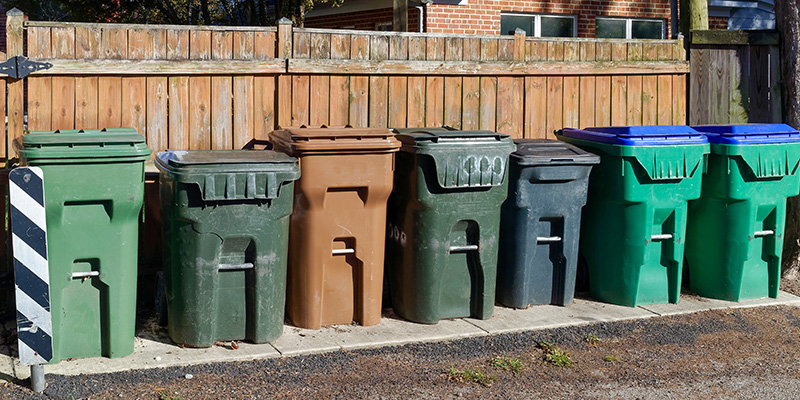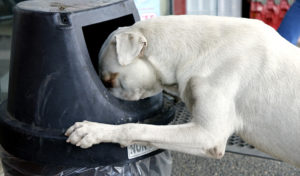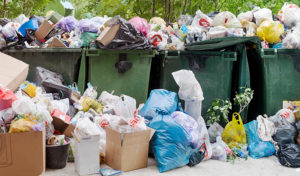Are HOA Trash Cans Becoming A Problem?

Homeowners associations are known for enforcing rules that help keep curb appeal and property values high. Some of these rules apply to trash cans, too. But, are rules about HOA trash cans even enforceable?
Browse By Category
Sign up for Our Newsletter
Homeowners associations are known for enforcing rules that help keep curb appeal and property values high. Some of these rules apply to trash cans, too. But, are rules about HOA trash cans even enforceable?
Are HOA Trash Can Rules Legal?
Trash cans play an important role in every household. And, in HOA communities, it is common to have rules on outdoor trash cans. But, are these rules even legal?
In a word, yes. Garbage can rules in homeowners associations are generally legal and enforceable, provided state laws and the HOA’s governing documents permit them. If an HOA’s governing documents don’t contain trash can rules, then the association likely can’t enforce them.
When HOA trash can violations occur, homeowners can face a monetary fine or have their member privileges temporarily revoked. Fines tend to add up, too, so it is important that all residents abide by the HOA’s trash can rules.
Some of the most typical trash rules in HOA communities include:
- Requiring residents to tie up trash bags securely
- Not allowing overhangs when residents dispose of their trash bags in bins
- Keeping all trash cans closed at all times
- Abide by the community’s recycling rules
- Prohibiting hazardous waste in trash bins
- Only allowing residents to take out their trash during certain times of the day or week
The Importance of Rules About HOA Trash Cans
Some homeowners might wonder why trash can rules even exist. After all, shouldn’t homeowners have control over their own garbage bins? The truth is, having an HOA trash cans policy is imperative for three reasons:
1. Maintain Aesthetics
First of all, trash cans don’t look attractive. Even if homeowners keep their trash bins sparkly clean, lining the streets with them does not exactly scream beautiful. While clean, trash cans are quite big and bulky. They also usually come in unappealing colors.
To keep the streets looking neat and attractive, most HOAs don’t allow homeowners to display their trash cans on the curb 24/7. This is especially true for suburban communities. Associations are trying hard to maintain a certain look and character, and these ugly garbage bins can interfere with that.
Additionally, trash smells awful, particularly organic waste. Leaving these bins on the curb can give the entire neighborhood a foul smell. This not only disturbs the neighbors but also turns off potential buyers.
2. Keep Wild Animals Away
 Communities are not immune to the occasional stray or wild animal. But, their numbers can double — or even triple — if homeowners just leave their trash bins out all the time. Trash might smell foul to you, but it can smell like a treat to wild critters.
Communities are not immune to the occasional stray or wild animal. But, their numbers can double — or even triple — if homeowners just leave their trash bins out all the time. Trash might smell foul to you, but it can smell like a treat to wild critters.
If you don’t want animals like cats, dogs, or raccoons rummaging through the bins, then HOA trash cans rules are a must. Trash can also attract rats and other rodents as well as insects. Even a neighbor’s escaped pet can start scavenging.
And, when strays and other wildlife rummage through the bins, they often end up tipping them over. Homeowners are then left with a huge mess that they will have to clean up.
3. Prevent Identity Theft
There were more than 1.5 million complaints about identity theft in the United States. And while identity theft nowadays mostly occurs online, it can also occur offline.
When you leave your garbage bins out on the curb all the time, thieves can come and rummage through your trash in search of documents that bear your information. Bills, bank statements, credit card offers, and all sorts of mail can end up in the wrong hands.
Some homeowners take the extra step of shredding any documents that contain their information. But, not everyone does this. Even those who do this can sometimes forget. When homeowners keep their bins out of sight, though, thieves can’t get to them.
Common HOA Trash Problems and How to Solve Them
Apart from trash can placement, homeowners associations also deal with a host of other trash problems. Here are the most common trash problems HOAs face and how to solve them.
1. Lacking Trash Services
 Many associations, particularly growing ones, lack adequate trash services. They don’t have the right number of bins or bin sizes, and their trash pick-up frequency may be too low. This often results in an accumulation of garbage on the side of the road.
Many associations, particularly growing ones, lack adequate trash services. They don’t have the right number of bins or bin sizes, and their trash pick-up frequency may be too low. This often results in an accumulation of garbage on the side of the road.
The best way to solve this is to take an observe-and-fix approach. First, evaluate the needs of the community. Take note of how much trash the residents produce. Then, come up with a plan that can accommodate those needs. That could mean adding more trash bins or scheduling more frequent trash pick-ups.
2. Disposal of Large Items
Every now and then, residents will need to dispose of large items such as old furniture, appliances, and mattresses. These large items not only take up a lot of space, but they can also look absolutely hideous. Depending on where you are, trash haulers either don’t dispose of those large items or charge an additional fee for the service.
A good way to prevent the pile-up of large items is to get a vendor to pick them up. If your hauler does not take large items, the HOA should hire a third party, such as a maintenance service provider, to come in regularly. To arrange pick-ups on an a la carte basis, have residents notify the board if they plan to dispose of large items.
3. Third-Party Trash
Sometimes, third-party vendors or contractors will need to do some work in the neighborhood. But, they can also leave trash behind or dump them in resident garbage enclosures. This can pose a problem as the vendor’s waste will take up valuable space normally reserved for residents.
Make sure the vendors or contractors the HOA hires understand that they are responsible for disposing of their own trash. During the vendor selection process, ask about their waste disposal practices. It is also a good idea to include a waste disposal clause in the contract.
4. Seasonal Trash Problems
 The volume of trash in a community can increase depending on the season. For instance, volumes tend o spike during the holiday season as people purchase or receive gifts and take advantage of holiday sales.
The volume of trash in a community can increase depending on the season. For instance, volumes tend o spike during the holiday season as people purchase or receive gifts and take advantage of holiday sales.
As a response, the association should make preparations for the holidays. The HOA may need to hire an extra service to pick up trash more regularly and keep the community clean. It is best to arrange this with your hauler or service provider ahead of time.
How Can HOAs Keep Trash Can Rules Reasonable?
It’s fine for homeowners associations to implement rules on HOA trash cans. However, it’s important to keep these rules within reasonable limits. Otherwise, homeowners may complain that the rules are too rigid or hard to fulfill. What should HOAs keep in mind to ensure the rules are fair and sensible?
First, don’t implement rules that require residents to leave trash cans out late at night. This may be dangerous for some residents. Moreover, if homeowners need to take their trash cans back in after garbage collection, make sure to give them a reasonable deadline. It shouldn’t interfere with school or work schedules.
Furthermore, remember to consider disabled homeowners. They may have a harder time moving large garbage cans around. To make things easier for them, grant them a variance. For instance, the HOA may set up a surround to hide their trash bins.
For Everyone’s Sake
While some homeowners might feel that the rules on HOA trash cans are suffocating, it is apparent that these rules serve a purpose. Having these rules and making sure residents follow them contributes to the overall cleanliness and appeal of the community.
Is your homeowners association having trouble enforcing rules and staying on top of trash schedules? Hire an HOA management company to help. Find the best one in your area today using our online directory!
RELATED ARTICLES:
- How to Pick the Right HOA Vendors
- What Are Unenforceable HOA Rules? What To Do About Them?
- How To Enforce Pool Rules In A Self-Managed HOA
Trending Now
Related Article
Sign up for Our Monthly Newsletter
Sign up below for monthly updates on all HOA Resource
















